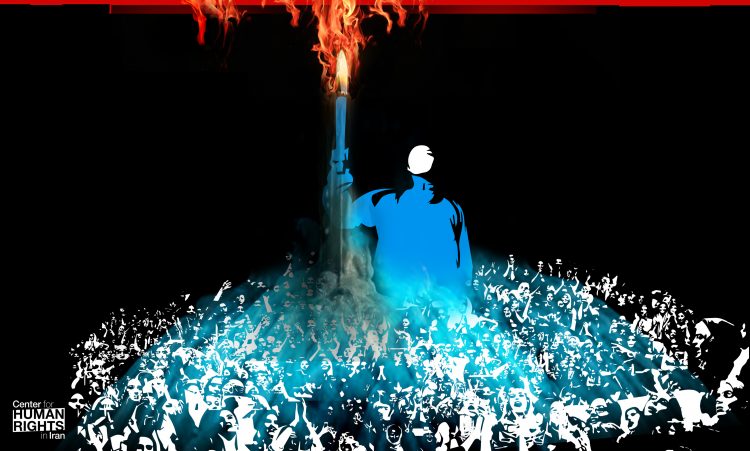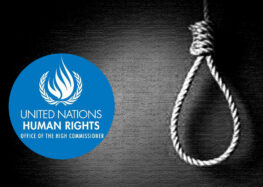Death of Iran’s “Blue Girl” Spotlights Senseless Ban on Women in Stadiums
 No More Empty Promises: FIFA Should Call on Iran to Lift Ban Once and For All
No More Empty Promises: FIFA Should Call on Iran to Lift Ban Once and For All
September 10, 2019 – The death of Sahar Khodayari, a woman who set herself on fire in Tehran because she thought she would have to serve jail time for trying to watch a soccer match, has put the spotlight on the costs of a discriminatory state policy that Iranian women have been protesting for decades.
“This senseless tragedy should be a turning point for Iran’s government, which has been ignoring calls by its people to lift its discriminatory ban on women in stadiums, and is now facing the human costs of that policy,” said Hadi Ghaemi, executive director of the Center for Human Rights in Iran (CHRI).
“FIFA should not allow itself to be manipulated by Iran’s occasional relaxation of its ban on women to ward off domestic and international pressure,” said Ghaemi. “It should uphold its statues against discrimination once and for all.”
Khodayari, 29, reportedly died on September 10, 2019, in the intensive care unit of Tehran’s Motahari Hospital after setting herself on fire outside a courthouse in Tehran. Shortly afterwards, her sister told an Iranian press outlet that the authorities ignored documents presented by her family regarding her mental health status.
“My sister is bipolar and she has been under doctor’s supervision for the past two years,” Khodayari’s sister (whose name is unknown) told the Rokna news website on September 4. “We had provided all the documents to the court but she was being prosecuted as a healthy person only because she cursed at the guards.”
Originally from the city of Qom, Khodayari was summoned to the courthouse to be tried after being arrested for trying to watch her favorite soccer team, FC Esteghlal, play at Tehran’s Azadi Stadium in March 2019. She set herself on fire after “she heard she had to stay in prison for six months,” her sister told Rokna.
Khodayari was referred to as the “Blue Girl” on social media networks because she was wearing the team’s signature blue color the day she was arrested.
In a statement, FIFA sent condolences to the Khodayari family and said it reiterates its “calls on the Iranian authorities to ensure the freedom and safety of any women engaged in this legitimate fight to end the stadium ban for women in Iran.”
Iran is the only country in the world that bans women from stadiums and has recently been told by FIFA that it must take steps to lift the ban to become compliant with FIFA statutes prohibiting discrimination. But FIFA has not explained what will happen if Iran does not lift the ban.
“This protest is not just about stadiums, it’s part of a growing women’s movement in Iran aimed at gaining basic human rights including equality as well as freedom of expression and speech,” Ghaemi said.
Criticism of Ban from Iranian Social Media, Public Figures and MPs
Iran-based press outlets were told they could no longer report on Khodayari’s story after it made international headlines, according to BBC Persian journalist Niki Mahjoub. The order was issued after some prominent public figures publicly condemned Khodayari’s death.
“Where men determine women’s fate and deprive them of their basic human rights, and there are women who help men in their tyranny, all of us are responsible for detaining and burning girls like this in the country,” tweeted prominent reformist female parliamentarian Parvaneh Salashouri on September 10, 2019.
On Instagram, famous former Iranian soccer player Ali Karimi wrote that he would not be entering Iranian stadiums “until further notice.”
In a September 5, 2019, interview with the daily “Iran” newspaper, the former head of Iran’s Football Federation (1994-97) Dariush Mostafavi had also criticized the authorities for prosecuting Khodayari and damaging Iran’s international reputation.
“The National Olympic Committee’s motto is freedom for humanity. What are they going to think about our society If FIFA’s [President Gianni] Infantino and his high-level friends at the Asian Football Confederation find out about this incident? How are they going to react toward our federation?” he said.
The re-election of President Hassan Rouhani on May 19, 2017, was due in large part to the perception by Iranian citizens that his government would work to uphold and improve human and women’s rights in Iran.
“President Rouhani has been silent and ineffective in response to ongoing protests by Iranian women and men for their basic rights,” said Ghaemi.
No Iranian law specifically forbids women from watching sports matches in stadiums, but the unofficial policy has been backed and implemented by hardline and conservative religious and security forces since 1981, two years after the country’s Islamic Revolution.
Responding to calls for the ban to be lifted, some officials have stated that stadiums in Iran are not “suitable” for women because they don’t have female-only seating sections or bathroom facilities.
Those officials have not explained why they haven’t taken steps to implement these requirements.
“Everyone, including women in Iran, should have the right to enjoy the beautiful game and access sports matches alongside male fans,” said Ghaemi. “Contentious people, including soccer players and fans, should raise their voices for Iran’s blue girl and all Iranian women who are risking everything to protest this ban,” he added.






